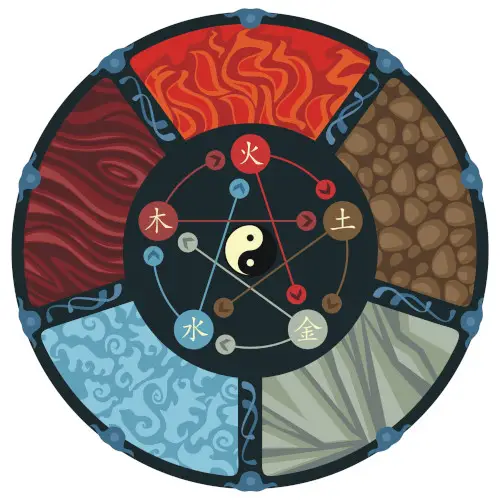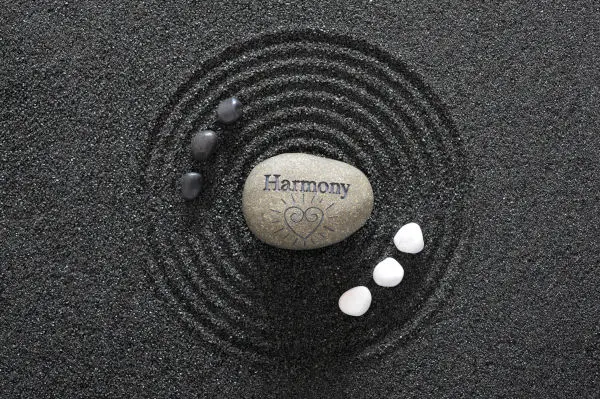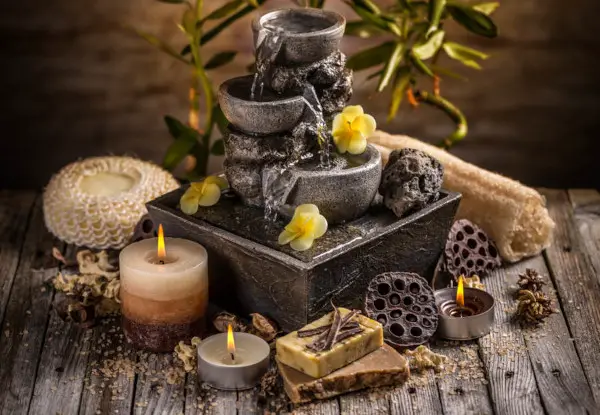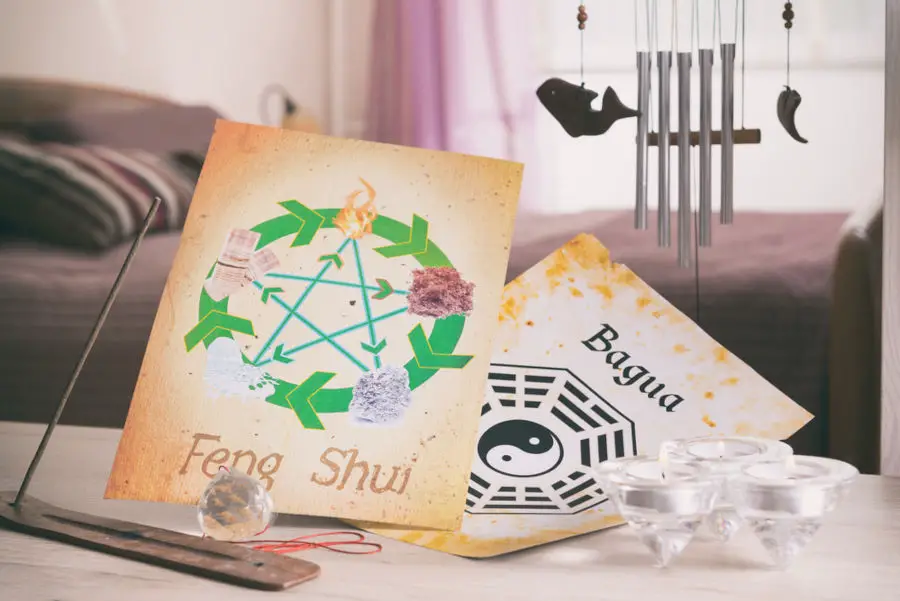Have you ever felt like your home environment could be doing more to support your well-being? Feng shui, the ancient Chinese practice of harmonizing energy flow, offers a powerful approach to creating a space that nourishes your mind, body, and spirit. By incorporating feng shui principles into your living areas, you can cultivate an environment that fosters better sleep, reduces stress, strengthens relationships, and attracts positive opportunities.
This comprehensive guide explores various aspects of feng shui and how you can leverage them to create a space that truly works for you. Whether you’re looking to boost your career prospects, enhance your creativity, or simply invite more peace and relaxation into your life, feng shui offers practical and actionable steps to achieve your goals.
The Philosophy Behind Feng Shui
The philosophy behind Feng Shui is rooted in the ancient Chinese understanding of the relationship between the visible and invisible worlds.
At the heart of feng shui lies the concept of Qi (Chi) energy, an invisible life force that flows through everything. Qi is the vital energy that sustains life, influencing health, mood, and overall well-being.
In feng shui, the goal is to harmonize your environment to ensure the free and balanced flow of Qi. When Qi is blocked or stagnant, it can lead to discomfort, stress, and a lack of vitality. Conversely, a space that promotes a smooth flow of Qi enhances positivity, health, and happiness.
By arranging furniture, decor, and spaces mindfully, you can guide the flow of Qi, creating an environment that nurtures and supports your life.
The Five Elements Theory
The Five Elements Theory is another cornerstone of feng shui philosophy. This theory encompasses five fundamental elements: Wood, Fire, Earth, Metal, and Water. Each element has unique characteristics and associations, influencing the energy in a space. For example:
- Wood symbolizes growth and vitality, promoting creativity and expansion.
- Fire represents passion and transformation, bringing warmth and energy.
- Earth stands for stability and nourishment, fostering grounding and support.
- Metal signifies clarity and precision, enhancing focus and order.
- Water embodies fluidity and abundance, encouraging relaxation and prosperity.
Balancing these elements within your environment is essential for harmonious living. This balance can be achieved through color schemes, materials, shapes, and specific objects associated with each element. By thoughtfully incorporating the Five Elements into your surroundings, you create a dynamic yet balanced space that promotes overall well-being.
Yin and Yang Balance
Yin and Yang are fundamental principles in feng shui that represent duality and balance. Yin is characterized by qualities such as softness, darkness, and receptiveness, while Yang embodies brightness, activity, and assertiveness. In any living space, maintaining a balance between Yin and Yang is crucial for a harmonious atmosphere.
Too much Yin energy can lead to stagnation and lethargy, while excessive Yang energy might cause restlessness and stress. For example, a bedroom, which is a place of rest and rejuvenation, should lean more towards Yin with soft lighting, gentle colors, and cozy textures. In contrast, a home office, where productivity and activity are key, should incorporate more Yang elements with bright lighting, vibrant colors, and energetic layouts.
Balancing Yin and Yang creates a dynamic and comfortable living environment. By paying attention to the interplay of these energies, you can design spaces that support both relaxation and activity, helping you achieve harmony and balance in your daily life.

Health Benefits of Feng Shui
Feng shui principles can have a profound impact on physical health by creating an environment that supports well-being. One key aspect is ensuring good air quality and natural light. Proper ventilation and plenty of sunlight are vital for maintaining a healthy living space. Plants can also play a significant role by improving air quality and adding vibrant life force energy (Qi) to a room.
Clutter is another factor that can affect physical health. A cluttered space can hinder the flow of Qi, leading to feelings of stagnation and lethargy. By decluttering and organizing your home, you can create a more open and breathable environment.
Additionally, positioning furniture to allow for free movement and placing your bed and workspaces in positions that provide support and security (such as facing the door) can help you feel more physically comfortable and less prone to stress-related ailments.
Enhancing Mental Well-being
The layout and design of your living space significantly influence your mental health. Feng shui aims to create environments that foster a sense of calm and balance, which is essential for mental well-being. Incorporating elements that resonate with your personal sense of peace, such as soft colors, serene artwork, and harmonious arrangements, can help create a soothing atmosphere.
The presence of natural elements like plants, water features, and natural materials can also enhance mental well-being by providing a connection to nature. This connection has been shown to reduce stress and improve mood. Additionally, mindful placement of mirrors can amplify natural light and create a sense of spaciousness, which can help alleviate feelings of confinement and stress.

Reducing Stress and Anxiety
Stress and anxiety can be significantly reduced through the thoughtful application of feng shui principles. One of the primary strategies is creating spaces that are free of clutter and distractions. A clean and orderly environment promotes a sense of control and calm. Additionally, incorporating soft, warm lighting can create a more relaxed atmosphere, helping to reduce stress levels.
The use of color in feng shui is also pivotal. Colors like blues and greens are known for their calming properties and can help reduce anxiety when used in bedrooms and living areas. On the other hand, brighter colors can be stimulating and are better suited for areas where energy and activity are desired.
Creating relaxation zones within your home is another effective feng shui practice for stress relief. These are areas designed specifically for unwinding and recharging, such as a cozy reading nook, a meditation corner, or a serene garden space. Incorporating natural elements, such as water fountains, can further enhance the calming effect by providing soothing sounds and a sense of tranquility.
“Our homes are a reflection of our inner world. By creating a harmonious and clutter-free environment, we can promote a sense of peace and well-being that extends to our physical health.” – Denise Linn, Feng Shui Expert
Colors Commonly Used in Feng Shui, Along with Their Corresponding Applications
| Color | Psychological Effects | Feng Shui Applications |
| Blue | Calming, soothing, promotes relaxation and tranquility. | Ideal for bedrooms and meditation spaces to promote restful sleep and inner peace. |
| Green | Renewal, growth, balance, promotes harmony and vitality. | Suitable for living rooms, home offices, and areas where creativity and productivity are desired. |
| Yellow | Cheerful, uplifting, stimulates mental activity and optimism. | Great for kitchens, dining rooms, and areas where socialization and communication occur. |
| Red | Passionate, energizing, stimulates excitement and activity. | Best used in moderation; ideal for areas where passion, courage, and motivation are desired. |
| Purple | Spiritual, regal, promotes introspection and wisdom. | Suitable for meditation rooms, libraries, and areas dedicated to personal growth and reflection. |
| Orange | Warm, inviting, promotes enthusiasm and creativity. | Ideal for exercise rooms, creative spaces, and areas where energy and inspiration are desired. |
| White | Purity, simplicity, promotes clarity and cleanliness. | Suitable for bathrooms, home offices, and areas where mental clarity and focus are desired. |
| Gray | Neutral, calming, promotes balance and stability. | Ideal for bedrooms, home offices, and areas where a sense of calm and stability is desired. |
| Brown | Grounding, nurturing, promotes a sense of security and warmth. | Suitable for entryways, living rooms, and areas where comfort and stability are desired. |
Related reading: 18 Interior Design Elements that are BAD Feng Shui – Opens in new tab
Feng Shui for Improved Relationships
Creating a harmonious home environment is foundational to nurturing positive relationships. Start by ensuring that common areas, such as the living room and dining room, are welcoming and free of clutter. Arrange seating in a way that encourages interaction, with chairs and sofas facing each other to promote conversation and connection.
Incorporating elements that symbolize unity and togetherness, such as artwork depicting pairs or groups, can further enhance the sense of harmony. Soft lighting, soothing colors, and natural elements like plants and flowers can create a calming and inviting atmosphere, making it easier for family members and guests to relax and enjoy each other’s company.
Enhancing Communication and Understanding
Effective communication is key to healthy relationships, and feng shui can help create environments that facilitate open and honest dialogue. The layout of your home can significantly impact how easily and comfortably conversations flow. For instance, round or oval dining tables are preferred in feng shui because they promote equality and inclusiveness, making it easier for everyone to engage in discussions.
In your home office or study, ensure that workspaces are organized and free of distractions, allowing for focused and meaningful conversations. Position desks and seating to face the door but not directly in line with it, which symbolizes openness to new ideas and perspectives while maintaining a sense of security.
Colors also play a role in enhancing communication. Warm, earth-toned colors like yellows and oranges can stimulate conversation and foster a sense of warmth and friendliness. Avoid overly bright or aggressive colors in areas where you want to encourage calm and constructive dialogue.

Strengthening Family Bonds
Strengthening family bonds involves creating a home environment that supports family activities and fosters togetherness. In feng shui, the family area is typically associated with the wood element, which symbolizes growth and vitality. Adding elements of wood, such as wooden furniture or decor, can enhance the family area, promoting harmony and cohesion.
Family photos and meaningful artwork should be prominently displayed in common areas to reinforce a sense of shared history and connection. Ensure that these items are well-lit and positioned where they can be easily seen and appreciated.
The kitchen is often considered the heart of the home in feng shui, as it’s a place where families come together to prepare and share meals. Keeping the kitchen clean, organized, and well-stocked can promote health and happiness, creating opportunities for family bonding over shared meals.
Creating spaces for shared activities, such as a game room, garden, or cozy reading nook, encourages family members to spend quality time together. Ensure these spaces are comfortable, inviting, and designed to accommodate the needs and interests of all family members.
🍀 Our “Feng Shui Master” app is your trusted companion, offering a useful guide to implementing Feng Shui principles. Try it now!
Boosting Productivity and Creativity with Feng Shui
Your workspace plays a critical role in your productivity and success. Feng shui offers several practical tips to optimize your workspace for maximum efficiency and positivity. Start by positioning your desk in the “command position,” where you can see the entrance to the room without being directly in line with the door. This position fosters a sense of control and security, helping you stay focused and confident.
Keep your workspace clean and organized to promote a clear mind. Clutter can block the flow of Qi, leading to distractions and reduced productivity. Use storage solutions to keep your desk tidy, and only keep essential items within reach. Incorporate elements that inspire and motivate you, such as personal mementos, uplifting artwork, or a vision board.
Lighting is crucial in feng shui. Natural light is best, so place your desk near a window if possible. If natural light is limited, use bright, balanced artificial lighting to keep your workspace well-lit and energizing. Add plants to your workspace to improve air quality and introduce calming, life-enhancing energy.
Enhancing Focus and Creativity
Feng shui can significantly enhance your focus and creativity by creating an environment that supports these qualities. Use colors strategically to influence your mental state. Blue and green tones are excellent for promoting concentration and calmness, while yellow and orange can stimulate creativity and enthusiasm.
Incorporate the elements of water and wood to enhance creativity. A small water feature or an aquarium can introduce a soothing flow of energy, sparking innovative ideas. Wooden elements, such as a wooden desk or decor, symbolize growth and can stimulate creative thinking.
Arrange your workspace to minimize distractions. Place your computer and other devices in a way that reduces glare and visual clutter. Consider using a room divider or plants to create a sense of separation between your workspace and other areas, helping you maintain focus.
Personalize your workspace with items that inspire you, whether it’s a piece of art, a favorite quote, or a collection of books. These elements can serve as sources of motivation and creativity, making your work environment more engaging and stimulating.

Creating a Balanced Work Environment
A balanced work environment is essential for sustained productivity and well-being. Feng shui emphasizes the importance of balancing the five elements—Wood, Fire, Earth, Metal, and Water—to create a harmonious space. Each element contributes to different aspects of productivity and should be represented in your workspace.
- Wood: Incorporate wooden furniture or decor to promote growth and creativity.
- Fire: Use lighting, candles, or red and orange accents to boost energy and passion.
- Earth: Add crystals, ceramics, or earthy colors to create stability and support.
- Metal: Include metal objects or white and gray tones to enhance focus and clarity.
- Water: Introduce water elements or blue and black colors to encourage relaxation and flow.
Balancing these elements can create a dynamic yet stable work environment that supports both high energy and calm concentration. Regularly refreshing your workspace by rearranging items or adding new elements can keep the energy flowing and prevent stagnation.
Additionally, ensure that your workspace supports ergonomic health. Use a comfortable chair, maintain good posture, and arrange your equipment to reduce strain. A physically comfortable environment contributes to sustained productivity and prevents fatigue.
“A cluttered workspace can create a cluttered mind. By decluttering and arranging your furniture in a way that promotes a smooth flow of energy, you can cultivate a more focused and productive environment.” – Derek Walters, Feng Shui Consultant
Indoor Plants Suitable for Feng Shui, Along with Their Care Requirements and Specific Benefits
| Plant | Care Requirements | Benefits |
| Peace Lily | Moderate to low light; water weekly. | Purifies indoor air, promotes tranquility, and symbolizes peace and harmony. |
| Snake Plant | Thrives in low light; water sparingly. | Purifies air, releases oxygen at night, and enhances energy flow in the home. |
| Bamboo Palm | Bright, indirect light; water moderately. | Filters indoor air pollutants, adds tropical ambiance, and symbolizes prosperity. |
| Aloe Vera | Bright, indirect light; water sparingly. | Air-purifying, soothes skin irritations, and promotes healing energy in the home. |
| Spider Plant | Indirect sunlight; water regularly. | Removes toxins from indoor air, promotes positive energy, and symbolizes vitality. |
| English Ivy | Moderate to bright light; keep soil moist. | Removes toxins, reduces mold levels, and promotes tranquility and emotional balance. |
| Rubber Plant | Bright, indirect light; water sparingly. | Cleanses indoor air, adds greenery, and enhances vitality and prosperity. |
| ZZ Plant | Low to bright indirect light; water infrequently. | Tolerates low light, purifies air, and enhances resilience and growth in the home. |
| Money Tree | Bright, indirect light; water moderately. | Attracts wealth and prosperity, purifies air, and symbolizes good fortune and luck. |
| Philodendron | Indirect sunlight; water moderately. | Removes toxins from indoor air, adds greenery, and promotes a sense of vitality. |
Improving Career Success
In feng shui, specific areas of your home and workspace are associated with career success. The most crucial area is the North sector, which is linked to the Water element and represents your career and life path. Enhancing this area can boost career opportunities and progression.
To activate the North sector, use elements and colors associated with Water, such as black, dark blue, and flowing shapes. Incorporating a small water feature, like a fountain or aquarium, can energize this space and attract career opportunities. Mirrors and glass objects also work well, reflecting light and energy to stimulate growth and movement.
Another important area is the front entrance of your home or office. This is where opportunities enter, so it should be clean, well-lit, and inviting. Ensure the door opens smoothly, and remove any obstacles that might block the flow of Qi. A welcoming entrance can enhance your career prospects by inviting positive energy and opportunities into your life.
Symbols for Career Advancement
Symbols play a significant role in feng shui, and specific items can attract career success and advancement. Here are some powerful symbols to consider:
- Dragon Tortoise: A dragon tortoise is a mythical creature combining the strengths of a dragon and a tortoise. Placing one in your office or North sector can bring career stability and protection, while also attracting opportunities and support.
- Crystal Globe: A crystal globe symbolizes knowledge, wisdom, and global reach. Keep it on your desk and spin it daily to activate its energy, which can enhance your professional reputation and expand your influence.
- Water Features: Small fountains or aquariums are excellent for career growth, symbolizing the flow of opportunities and prosperity. Place them in the North sector to maximize their effect.
- Fish: In feng shui, fish represent abundance and good fortune. Keeping a small aquarium with goldfish or a decorative fish figurine in your workspace can attract wealth and career success.
- Bamboo: Known for its resilience and rapid growth, bamboo is a powerful symbol for career advancement. Place a small bamboo plant on your desk or in the North sector to inspire personal and professional growth.
- Personal Growth Symbols: Surround yourself with symbols that inspire and motivate you. This could include vision boards, motivational quotes, or objects related to your career goals. These symbols keep your objectives in focus and remind you of your ambitions.

Attracting Positive Opportunities
In feng shui, the entrance to your home or office is considered the “mouth of Qi,” where energy and opportunities flow in. To attract new opportunities, it is essential to ensure your entryway is inviting and unobstructed. Start by keeping the area clean and well-maintained. Remove any clutter, dead plants, or broken items, as these can block the flow of positive energy.
The door itself should be sturdy and in good condition, opening smoothly without creaks or resistance. A brightly colored or red door can attract attention and symbolize good fortune. Additionally, placing a welcome mat can invite positive energy and make a good impression on visitors.
Lighting is also crucial. Ensure the entryway is well-lit, using soft, warm lighting to create an inviting atmosphere. Adding plants or flowers near the entrance can further enhance the flow of Qi and symbolize growth and new beginnings.
Inviting Good Luck with Feng Shui
Good luck can be invited into your life by incorporating specific feng shui symbols and practices. Here are some effective ways to enhance your luck:
- Lucky Bamboo: Known for its resilience and growth, lucky bamboo is a popular feng shui plant that symbolizes prosperity and good fortune. Place it in the East or Southeast sectors of your home or office to attract positive energy.
- Coins and Wealth Symbols: Chinese coins tied with red ribbon, wealth ships, and other prosperity symbols can be strategically placed in your home or workspace to invite financial luck and opportunities. These symbols work best in the Southeast sector, which is associated with wealth.
- Crystals: Crystals such as citrine, amethyst, and clear quartz can attract positive energy and amplify good luck. Place them in areas where you want to enhance the flow of opportunities, such as your desk, entryway, or wealth corner.
- Wind Chimes: Hanging wind chimes near the entrance or in areas with stagnant energy can help disperse negative energy and attract good luck. Choose chimes made of metal, as they are particularly effective in enhancing the flow of Qi.
- Elephants: Elephants are symbols of strength, wisdom, and protection. Placing elephant figurines, especially those with their trunks up, in your home or office can attract good fortune and protect against negative energy.
- Visualization is Key: Take time to visualize your goals and aspirations. Create a vision board in your north sector (career) or east sector (health) featuring images and words that represent your desires. This reinforces your intentions and attracts positive energy to align with your goals.
- The Power of Gratitude: Cultivate an attitude of gratitude for the good things in your life. Expressing appreciation opens you up to receiving even more blessings and opportunities.
By incorporating these symbols and practices, you can transform your space into a magnet for positive energy and opportunities. Remember, feng shui is a journey, not a destination. Enjoy the process of creating a supportive environment and watch as new possibilities unfold.
Feng Shui Symbols and Their Meanings
| Symbol | Meaning | Feng Shui Application |
| Bagua Mirror | Protection, deflects negative energy. | Placed above doors or windows facing negative energy sources, such as sharp corners or T-junctions. |
| Dragon | Power, strength, good fortune. | Positioned in the career area of the home or office to enhance career success and prosperity. |
| Phoenix | Rebirth, transformation, renewal. | Placed in the love and relationship area to promote harmony and strengthen romantic bonds. |
| Turtle | Longevity, stability, protection. | Placed in the north area of the home to enhance career success and promote long-term stability. |
| Fu Dogs | Guardian, protection, prosperity. | Positioned near the entrance of the home or office to guard against negative energy and promote wealth. |
| Wealth Vase | Attracts wealth, abundance, prosperity. | Placed in the wealth area of the home to enhance financial stability and attract abundance. |
| Lucky Bamboo | Prosperity, good luck, vitality. | Kept in the wealth area or on desks to attract good fortune and promote positive energy flow. |
| Laughing Buddha | Happiness, contentment, abundance. | Positioned in the main living area to invite joy and prosperity into the home. |
| Money Frog | Wealth, prosperity, abundance. | Placed near the entrance facing inward to attract wealth and abundance into the home. |
| Eight Auspicious Symbols | Good fortune, blessings, enlightenment. | Displayed in prominent areas of the home to invite blessings and positive energy into the space. |
Related reading: Feng Shui Tips for Good Luck: Simple Practices for Big Results – Opens in new tab
Financial Benefits of Feng Shui
Feng shui is a powerful tool for attracting wealth and prosperity into your life. The Southeast sector of your home or office is associated with wealth and abundance. Enhancing this area can help draw financial opportunities and increase prosperity.
To activate the wealth corner, incorporate elements that symbolize growth and abundance. Use the Wood and Water elements, such as lush green plants, water features, and wooden furniture or decor. Colors like green, purple, and gold are also beneficial in this area.
Adding symbols of wealth can further enhance this sector. Consider placing a money tree plant, which is known for attracting financial luck. A wealth vase, filled with symbols of abundance like coins, crystals, and rice, can also be a powerful addition. Ensure that this area is well-lit and free from clutter to maintain the free flow of positive energy.
Feng Shui Tips for Financial Stability
Financial stability is an essential aspect of overall well-being, and feng shui can help create a solid foundation for financial security. Here are some effective feng shui tips for achieving financial stability:
- Balance the Five Elements: Ensure your home or office includes a balanced representation of the five elements—Wood, Fire, Earth, Metal, and Water. This balance creates harmony and supports financial stability. For example, a wooden desk (Wood), a candle (Fire), a crystal (Earth), a metal lamp (Metal), and a water fountain (Water) can collectively enhance stability.
- Entrance Optimization: Your front door is the main entry point for energy, including financial opportunities. Keep it clean, well-maintained, and inviting. Use a welcoming mat and ensure the door opens smoothly. A clear and inviting entrance can attract positive energy and financial opportunities.
- Aquariums and Water Features: Water is a powerful symbol of wealth in feng shui. Adding an aquarium or a water fountain in your home or office, especially in the North or Southeast sectors, can attract and maintain financial flow. Ensure the water is clean and the feature is well-maintained to keep the energy fresh and vibrant.
- Symbolic Decor: Incorporate decor that symbolizes wealth and abundance, such as a bowl of oranges, which represent prosperity, or a laughing Buddha statue, known for bringing good fortune. Place these items in strategic locations to amplify their positive effects.
- Declutter and Organize: Clutter can obstruct the flow of positive energy and create stagnation. Regularly declutter your living and working spaces to promote a clear and organized environment. This practice not only improves energy flow but also enhances clarity and focus, essential for financial decision-making.
- Repair and Maintain: Leaky faucets, broken lamps, and damaged furniture are believed to symbolize obstacles to wealth in feng shui. Address any maintenance issues promptly to prevent financial leaks and cultivate a sense of abundance.
- Mindful Spending: While feng shui can support your financial goals, it doesn’t replace responsible budgeting. Be mindful of your spending habits and avoid impulse purchases. A healthy respect for money complements the positive energy cultivated through feng shui.

Feng Shui and Personal Growth
Feng shui can significantly enhance self-awareness by creating an environment that encourages introspection and clarity. Begin by incorporating elements that promote calmness and reflection. Natural light, serene colors, and soft textures can help create a peaceful atmosphere conducive to self-awareness.
Mirrors are powerful tools in feng shui for self-awareness. Placing a mirror in areas where it reflects light and beautiful views can increase the sense of openness and clarity. However, avoid placing mirrors directly opposite your bed or desk, as this can create restlessness and distraction.
Decluttering your space is another essential practice. A cluttered environment can lead to a cluttered mind, making it difficult to focus on personal growth. By maintaining a clean and organized space, you can enhance mental clarity and create room for self-reflection.
Personalize your space with items that inspire you and remind you of your values and goals. This could include meaningful artwork, photographs, or objects that have personal significance. These items can serve as constant reminders of your journey and aspirations, keeping you grounded and focused on your self-awareness and growth.
Fostering Personal Development
Feng shui fosters personal development by creating an environment that supports learning, growth, and self-improvement. The Southeast sector of your home is associated with knowledge and self-cultivation. Enhance this area with items related to your personal development goals, such as books, study materials, or tools for your hobbies.
Incorporate elements that symbolize growth and progress. Plants are particularly effective, as they represent life and continuous growth. A healthy, thriving plant in your study or personal development area can inspire you to keep learning and growing.
Use colors that stimulate mental activity and creativity, such as blue for wisdom, green for growth, and yellow for clarity. These colors can be incorporated through wall paint, decor, or accessories in your study or personal development space.
Creating a dedicated space for meditation or mindfulness practices can also foster personal development. This space should be quiet, comfortable, and free from distractions, allowing you to focus on your inner growth. Add elements like cushions, candles, or soothing sounds to enhance the calming atmosphere.
Related reading: Why Your Feng Shui Doesn’t Work? 9 Reasons and How to Fix Them – Opens in new tab

Using Feng Shui for a Peaceful Mind
In our fast-paced world, finding moments of peace and tranquility can feel like a luxury. Feng shui offers a unique approach to creating a haven within your own home, promoting a calm and serene environment that fosters a peaceful mind and enhances spiritual well-being.
Meditation Spaces and Feng Shui
In Feng Shui, the ideal meditation space is one that is quiet, uncluttered, and free from distractions. By designating a specific area in your home or office for meditation, you can create a sanctuary that is conducive to inner reflection and spiritual practice. When setting up a meditation space, consider the following Feng Shui tips:
- Locate the space in a quiet, low-traffic area of your home, away from windows and doors.
- Use calming colors like blue, green, or white to promote a sense of tranquility.
- Incorporate natural elements like plants, water features, or natural lighting to connect with the natural world.
- Avoid placing the meditation space directly in line with the entrance or other high-traffic areas.
By creating a dedicated meditation space that aligns with Feng Shui principles, you can cultivate an environment that supports your spiritual practice and helps you achieve a peaceful state of mind.
Creating a Calm and Serene Environment
Feng Shui emphasizes the importance of creating a harmonious and balanced environment to promote calmness and serenity. By incorporating specific design elements and energy-clearing practices, you can transform your living or working space into a sanctuary of peace and tranquility. Some Feng Shui tips for creating a calm and serene environment include:
- Decluttering and organizing your space to remove stagnant energy.
- Incorporating natural elements like plants, water features, or natural lighting.
- Using soothing colors and soft, indirect lighting to create a relaxing ambiance.
- Placing mirrors strategically to reflect and amplify positive energy.
- Regularly cleansing the space with sage or other purifying rituals.
By implementing these Feng Shui practices, you can cultivate an environment that supports your mental and emotional well-being, allowing you to feel more grounded, centered, and at peace.
“Clutter can be a major source of stress in our lives. By regularly decluttering our homes, we can create a sense of order and reduce visual overwhelm, promoting feelings of calm and well-being.” – Marie Kondo, Author of “The Life-Changing Magic of Tidying Up”

Enhancing Spiritual Well-being
Feng Shui also recognizes the importance of nurturing one’s spiritual growth and connection to the divine. By incorporating specific symbols, objects, and energy-enhancing practices, you can create a space that supports your spiritual well-being and helps you deepen your connection to the higher realms. Some Feng Shui techniques for enhancing spiritual well-being include:
- Placing a Feng Shui Bagua mirror near the entrance to protect against negative energy.
- Incorporating spiritual symbols, such as Tibetan singing bowls or Feng Shui Wealth Frogs, to attract positive energy.
- Aligning the placement of your furniture and decor with the Bagua map to support specific areas of your life, including spirituality.
- Regularly engaging in energy-clearing practices, such as burning sage or using essential oils, to maintain a high-vibrational environment.
By embracing these Feng Shui principles and creating a space that nurtures your spiritual well-being, you can cultivate a profound sense of inner peace, clarity, and connection to the divine.
Table outlining essential items for creating a relaxation zone
| Item | Description |
| Comfortable Seating | Plush cushions, cozy armchairs, bean bags, or floor pillows for lounging and relaxation. |
| Soft Lighting | Table lamps, floor lamps, or string lights with adjustable brightness for a soothing ambiance. |
| Calming Decor | Soft blankets, throw rugs, and curtains in muted colors or natural textures for added comfort. |
| Relaxing Sounds | Bluetooth speakers or white noise machines playing calming nature sounds or soft music. |
| Relaxation Tools | Meditation cushions, yoga mats, or aromatherapy diffusers with essential oils for relaxation. |
| Inspirational Items | Books, journals, or artwork that inspire and uplift the mind, promoting relaxation and reflection. |
| Greenery | Indoor plants like peace lilies, snake plants, or succulents to purify the air and add a touch of nature. |
| Tranquil Scents | Scented candles, incense, or essential oils with calming fragrances like lavender, chamomile, or eucalyptus. |
| Stress-Relief Activities | Coloring books, puzzles, or stress balls for engaging in calming activities and reducing tension. |
| Digital Detox Tools | Charging stations or baskets for storing electronic devices out of sight, promoting screen-free relaxation. |
Feng Shui for Better Sleep
Creating an optimal bedroom layout and positioning is essential for promoting restful sleep and maximizing the flow of positive energy. Start by positioning your bed in the “command position,” where you have a clear view of the door without being directly in line with it while lying in bed. This position enhances feelings of security and control, promoting relaxation and restfulness.
Avoid placing your bed under a window or directly across from the door, as these positions can disrupt the flow of Qi and create feelings of vulnerability. Instead, position your bed against a solid wall for support and stability.
Ensure there is ample space around your bed for easy movement and access. Avoid cluttering the area with unnecessary furniture or objects, as this can create stagnant energy and inhibit restful sleep. Keep pathways clear and open to allow Qi to flow freely throughout the room.
Colors and Elements for Restful Sleep
Choosing the right colors and elements for your bedroom decor can significantly impact the quality of your sleep. Soft, soothing colors like light blue, lavender, and pale green are ideal for promoting relaxation and tranquility. These colors have calming effects on the mind and body, helping to reduce stress and induce sleepiness.
Incorporate elements of nature into your bedroom decor to create a restful sleep environment. Natural materials such as wood, bamboo, and cotton can add warmth and texture to your space while evoking a sense of serenity and connection to the earth.
Water features, such as a small tabletop fountain or a fish tank, can also enhance the calming atmosphere of your bedroom. The gentle sound of flowing water can promote relaxation and mask disruptive noises, helping you drift off to sleep more easily.
Avoid using stimulating colors like bright red or orange in your bedroom decor, as these colors can increase energy levels and inhibit relaxation. Similarly, avoid harsh or artificial lighting, opting instead for soft, diffused lighting sources like bedside lamps or dimmer switches.
Related reading: Avoid Bad Feng Shui: 12 House Features to Improve – Opens in new tab

Eliminating Negative Energy
Eliminating negative energy from your bedroom is essential for creating a peaceful and restful sleep environment. Start by decluttering your space and removing any items that evoke negative emotions or associations. This could include old photographs, gifts from past relationships, or reminders of stressful situations.
Clear the air in your bedroom by opening windows regularly to allow fresh air to circulate. You can also use natural air purifiers like houseplants or salt lamps to cleanse the air and remove pollutants.
Regularly smudging your bedroom with sage or palo santo can help clear away negative energy and promote a sense of calm and tranquility. Simply light the smudge stick and allow the smoke to waft throughout the room, focusing on areas where negative energy may be concentrated.
Incorporate protective symbols and objects into your bedroom decor to ward off negative energy and promote feelings of safety and security. This could include crystals like amethyst or black tourmaline, as well as symbols of protection like the evil eye or a guardian deity.
Want to learn more about Feng Shui? Take a look at these Courses and Books – Aff.link
Increasing Energy and Vitality
Feng shui offers several effective practices for boosting energy and vitality in your living environment. One key practice is to declutter and organize your space regularly. Clutter can block the flow of Qi, or life force energy, leading to feelings of stagnation and lethargy. By clearing away unnecessary items and organizing your surroundings, you can create a space that feels open, vibrant, and energizing.
Introduce elements of nature into your home to invigorate your space and enhance your vitality. Plants, in particular, are powerful energy enhancers, purifying the air and infusing your environment with fresh, oxygen-rich air. Choose plants with broad, lush leaves, such as peace lilies, snake plants, or philodendrons, to promote a sense of vitality and well-being.
Another energy-boosting feng shui practice is to maximize natural light in your home. Sunlight is a natural source of energy and can have a significant impact on your mood and vitality. Keep curtains and blinds open during the day to allow sunlight to flood your space, and position mirrors strategically to reflect and amplify natural light throughout your home.
Enhancing Vitality Through Space Arrangement
Space arrangement plays a crucial role in enhancing vitality and energy flow throughout your home. Arrange furniture and decor in a way that promotes ease of movement and encourages the flow of Qi throughout your space. Avoid placing furniture in direct line with doorways or pathways, as this can create obstacles to energy flow and inhibit vitality.
Create designated areas for activities that promote energy and vitality, such as exercise, meditation, and creative pursuits. Ensure these areas are well-lit, well-ventilated, and free from clutter to maximize their energizing effects. Incorporate elements like mirrors, plants, and artwork that inspire and uplift you, enhancing the overall vitality of your space.
Incorporate symbols of vitality and well-being into your decor to further enhance the energy of your space. This could include images of vibrant landscapes, representations of the sun or other sources of energy, or symbols of health and vitality like the lotus flower or the phoenix. Surrounding yourself with these symbols can serve as a constant reminder to prioritize your physical and emotional well-being.
Energy-Boosting Feng Shui Practices
| Practice | Description |
| Decluttering | Clearing away excess belongings and organizing your space to promote the flow of energy and create a sense of spaciousness. |
| Space Clearing | Cleansing your home of stagnant or negative energy using techniques such as smudging, sound healing, or salt bowl rituals. |
| Enhancing Natural Light | Maximizing natural light in your home by opening curtains, using mirrors to reflect light, and trimming back overgrown foliage. |
| Balancing the Five Elements | Incorporating elements of wood, fire, earth, metal, and water into your decor to promote balance and harmony in your space. |
| Activating Bagua Areas | Energizing specific areas of your home based on the bagua map to enhance different aspects of your life, such as career or love. |
| Using Crystals | Placing crystals strategically throughout your home to harness their healing properties and amplify positive energy flow. |
| Incorporating Aromatherapy | Using essential oils and diffusers to fill your home with calming scents that promote relaxation, focus, and emotional well-being. |
| Sound Healing | Using instruments such as singing bowls, bells, or chimes to create soothing sounds that promote relaxation and energy flow. |
| Space Blessing | Blessing your home with positive intentions, prayers, or rituals to infuse it with love, harmony, and protection. |
| Feng Shui Consultation | Seeking guidance from a feng shui expert to assess your home’s energy flow and provide personalized recommendations for improvement. |
🍀 Our “Feng Shui Master” app is your trusted companion, offering a useful guide to implementing Feng Shui principles. Try it now!
Feng Shui and Children
Feng shui principles can be applied to create a nurturing and supportive environment for children that promotes their physical, emotional, and cognitive development. Start by designing their bedroom or play area with their needs and preferences in mind. Allow them to participate in the decorating process, incorporating colors, themes, and decor that reflect their interests and personalities.
Ensure their sleeping area is conducive to restful sleep by following feng shui guidelines for bedroom layout and positioning. Position their bed away from sources of disruptive energy, such as windows or doors, and create a calm and soothing atmosphere with soft, neutral colors and natural materials.
Incorporate elements of nature into their environment to foster a sense of connection to the natural world. Consider adding plants, animals, or images of nature to their decor, as these elements can have a calming and grounding effect on children.
Enhancing Learning and Development
Feng shui principles can support children’s learning and development by creating a stimulating and organized environment that encourages exploration and creativity. Designate specific areas for different activities, such as reading, art, and play, and ensure these areas are well-defined and clutter-free.
Incorporate elements that stimulate the mind and inspire curiosity, such as books, puzzles, and educational toys. Display these items prominently and make them easily accessible to encourage independent learning and exploration.
Create a study area for older children that is conducive to concentration and focus. Position their desk in the command position, away from distractions, and ensure it is well-lit with natural or full-spectrum lighting. Encourage them to personalize their study space with items that motivate and inspire them, such as inspirational quotes or images of role models.

Promoting Positive Behavior
Feng shui can also promote positive behavior in children by creating a harmonious and balanced environment that supports their emotional well-being. Incorporate elements that evoke feelings of love, happiness, and security, such as family photographs, artwork, and symbols of protection.
Encourage open communication and emotional expression by creating a welcoming and supportive atmosphere in your home. Establish clear boundaries and routines to provide structure and stability for your children, and encourage them to participate in household tasks and decision-making.
Create a peaceful and calming atmosphere by minimizing sources of stress and conflict in your home. Keep clutter to a minimum, establish designated areas for different activities, and promote relaxation and connection through activities like family meals, storytelling, and quiet time together.
End Words
Feng shui is not a rigid set of rules, but rather a framework for creating a harmonious and supportive environment. As you experiment with different practices, be mindful of your own intuition and what resonates most with you.
Remember, the most important aspect of feng shui is creating a space that feels good to you – a space that reflects your personality and supports your overall well-being. So, embark on your feng shui journey and discover how transforming your environment can transform your life!
Want to learn more about Feng Shui? Take a look at these Courses and Books – Aff.link
Stay in Touch
 Join our newsletter by using the forms on this website or click here!
Join our newsletter by using the forms on this website or click here! Follow us on Google News
Follow us on Google News Follow us on Facebook
Follow us on Facebook
Featured Image from Depositphotos





